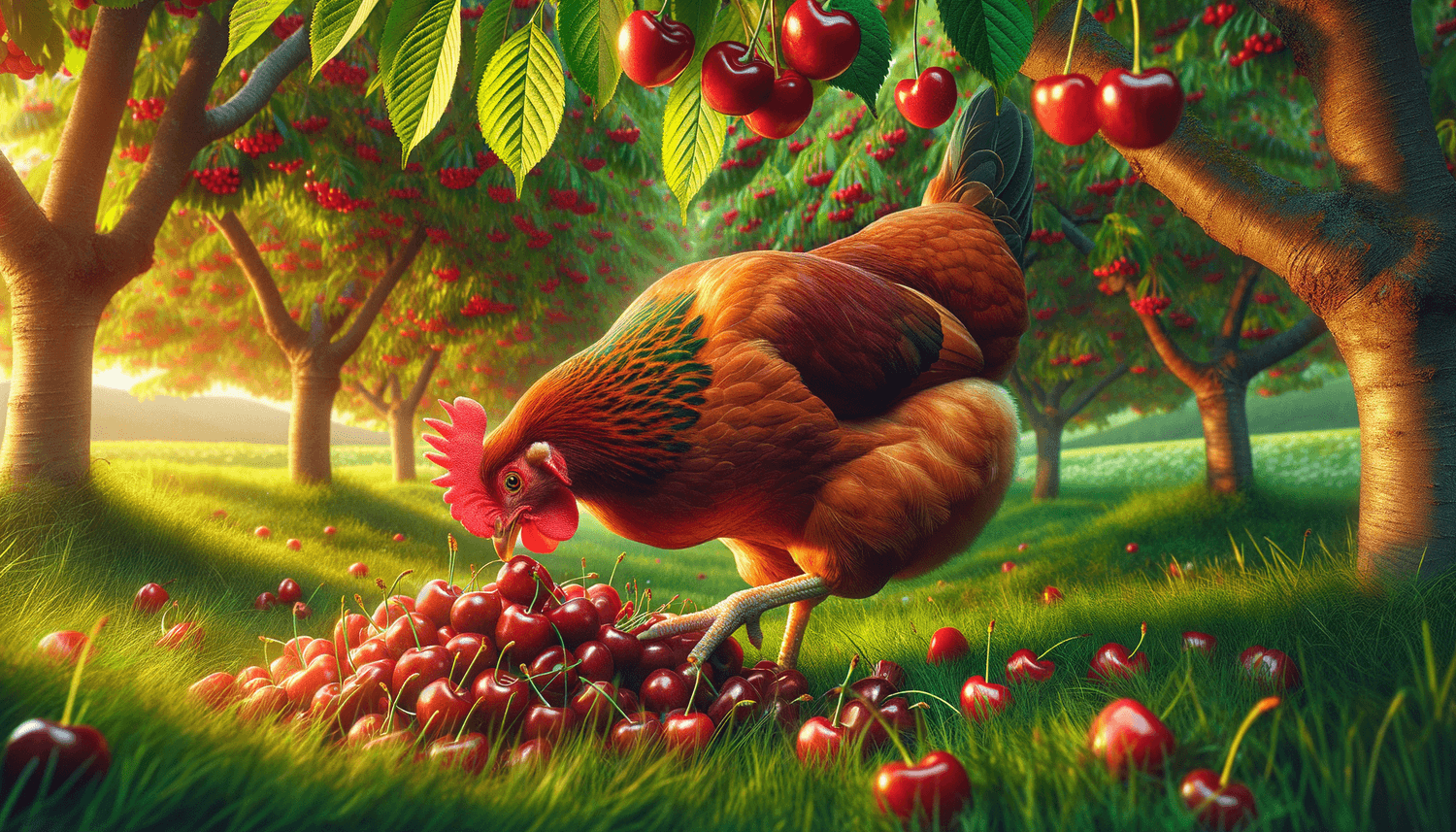Picture this: You’re basking in the summer sun, savoring a big bowl of juicy, ruby-red cherries, and your lovable backyard chickens give you that knowing look. Can they indulge in this sweet summer treat too? In this fun-filled blog post, we will explore whether chickens can eat cherries or not, the importance of a balanced diet, the potential benefits or risks, the nutritional value of cherries, and how best to prepare these fruity morsels to please your feathered friends. So grab your favorite sun hat and join us on this delicious adventure!
Can chickens eat cherries?
Yes, chickens can eat cherries, and it is safe for them to do so. Cherries are an excellent source of vitamins, antioxidants, and deliciousness for your feathered friends. However, be sure to remove the cherry pits and limit their consumption for a balanced diet, as cherry pits contain a small amount of cyanide, which can be harmful if consumed in large quantities.
A balanced diet for backyard chickens
Just like humans, chickens require a balanced diet to stay healthy and thrive. A proper diet ensures your feathered pals get all the essential nutrients they need, promoting a robust immune system, healthy digestion, proper egg production, and overall well-being. A chicken’s diet should primarily consist of high-quality chicken feed, making up around 80-90% of their daily intake. Chicken feed is specifically designed by experts to provide your flock with the perfect mix of proteins, vitamins, and minerals essential for optimum growth and development.
The remaining 10-20% of a chicken’s diet can be comprised of treats such as fruits and vegetables. Introducing a variety of treats not only adds excitement and variety to their diet, but it can also introduce additional vitamins and minerals when consumed in moderation. Keep in mind, though, that even healthy treats should be limited – overindulging can lead to an imbalance in their carefully crafted diet. So feel free to share those cherries with your chickens, but always remember the importance of a balanced, nutritious chicken feed as the foundation of their daily meals.
Nutritional value of cherries for chickens.
Feeding cherries to chickens provides various nutritional benefits to support their overall health. Cherries are loaded with vitamins A and C, which aid in supporting the immune system and promote healthy skin and feather quality. Vitamin A also plays a role in maintaining good eyesight, an essential attribute for birds. Vitamin C, on the other hand, has antioxidant properties, which can help protect the body against cell damage, boost immunity, and accelerate the healing process for minor injuries.
In addition to vitamins, cherries are also an excellent source of hydration for your chickens. With a high water content, they can help keep your flock hydrated, especially during hot summer days. This source of hydration can also assist in maintaining healthy digestion, making it easier for your chickens to process their food and absorb nutrients.
Another benefit of cherries is their low-calorie profile, meaning that they serve as a healthier treat option for your chickens. Moreover, cherries are high in natural antioxidants and phytonutrients, which provide essential nutrients that can support your chickens’ overall health. These benefits make cherries not only a delicious but also a highly nutritious snack for your backyard flock.
Nutrition table of cherries for chickens.
| Information | Description |
|---|---|
| Nutritional Value | Rich in vitamins A and C, antioxidants, and phytonutrients. |
| Suggested Serving Size | Small portions as treats, making up 10-20% of their diet. |
| Safe Feeding Practices | Remove pits and limit consumption for a balanced diet. |
| Preparation | Wash cherries and remove pits before serving. |
| Potential Risks | Cherry pits contain cyanide, which can be harmful in large quantities. |
| Hydration | High water content to help your chickens stay hydrated. |
| Digestion | Hydration from cherries supports healthy digestion. |
| Seasonal Availability | Cherries are typically available during summer months. |
| Other Benefits | Low-calorie treat with various health-supporting nutrients. |
Introducing treats safely to your flock
When introducing new treats like cherries to your chickens, it’s essential to do so gradually and cautiously. In the beginning, provide a small amount and closely monitor your flock for any signs of digestive issues or other health problems. Chickens might react differently to various foods, so always keep an eye on your flock’s behavior and adjust their diet accordingly.
Fun and engaging treat feeding techniques
Feeding treats creatively can help keep your chickens stimulated and entertained. For example, you can string cherries together and hang them in the run, encouraging chickens to jump and peck at them. Such treat-dispensing games promote physical activity and mental stimulation, ensuring a happy flock.
Other cherry-like treats for your chickens
If your flock enjoys cherries, you can also consider including other small fruits in their diet as treats. Berries like raspberries, strawberries, and blueberries make excellent snack options, providing similar nutritional benefits and variety in their diet. Remember to always feed these treats in moderation.
Final thoughts
In conclusion, cherries are safe and nutritionally beneficial for backyard chickens when prepared and fed correctly. Ensuring a balanced diet enriched with occasional treats like cherries keeps your flock happy, healthy, and thriving. As a responsible chicken keeper, always stay informed and open to learning about how to offer the best care and nutrition to your feathered friends.

















